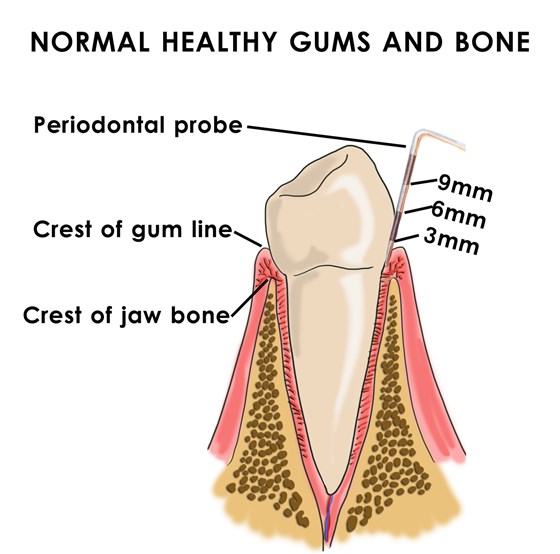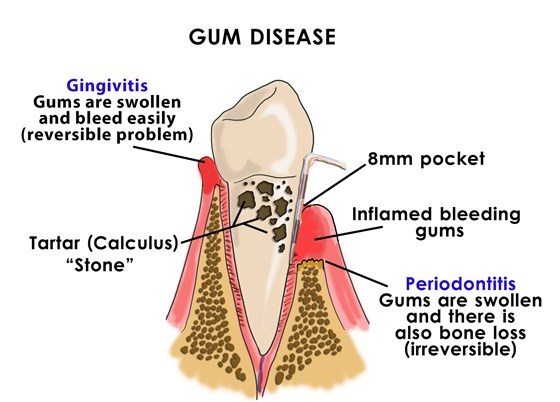Deep cleaning
TL;DR: Ask the opinion of two or three independent dentists before doing a deep clean.
Scaling and root planing, also known as conventional periodontal therapy, non-surgical periodontal therapy or deep cleaning, is a procedure involving removal of dental plaque and calculus (scaling or debridement) and then smoothing, or planing, of the (exposed) surfaces of the roots, removing cementum or dentine that is impregnated with calculus, toxins, or microorganisms, the etiologic agents that cause inflammation. It is a part of non-surgical periodontal therapy. This helps to establish a periodontium that is in remission of periodontal disease.
As to the frequency of cleaning, research on this matter is inconclusive. That is, it has neither been shown that more frequent cleaning leads to better outcomes nor that it does not. Thus, any general recommendation for a frequency of routine cleaning (e.g. every six months, every year) has no empirical basis. (1)
Why do we need deep cleaning⚑
We all have a plethora of bacteria in our mouths. Those bacteria mix with other substances to form sticky plaque on teeth, which is mostly banished by regular brushing and flossing.

Plaques that don't get brushed away can harden and form a substance known as tartar, which can only be removed with a dental cleaning. When tartar remains on the teeth, it can cause inflammation of the gums, a condition called gingivitis, characterized by red swollen gums that can bleed easily. A mild form of gum disease, gingivitis can usually be reversed through regular brushing and flossing along with cleanings by a dentist or hygienist.

If gingivitis isn't cured, it can advance to a more severe form of gum disease called periodontitis, in which the inflamed tissue begins to pull away from the teeth, forming spaces, or pockets. As the pockets become deeper, more of the tooth below the gum line is exposed to bacteria, which can damage the bone holding teeth in place.
Eventually, if the pockets become deep enough, teeth can become loose and may even be lost. Dentists measure the depth of the pockets with a probe that has a tiny ruler on the end. Healthy gums have pockets that measure no more than 3 mm — or a little less than a tenth of an inch — deep. More than that and you’re getting into trouble.
One way to slow or halt the process is through deep cleaning, which removes the plaque below the gum line and smooths rough spots on the tooth root, making it harder for bacteria to accumulate there.
Signs of periodontitis⚑
- Red or swollen gums
- Tender or bleeding gums
- Persistent bad breath
- Your teeth look like they’ve been getting longer as gums recede.
- Teeth that are sensitive
- Loose teeth
- Pain when chewing
Evidence-based dentistry⚑
Several systematic reviews have been made of the effectiveness of scaling and root planing as evidence-based dentistry. A Cochrane review by Worthington et al. in 2013 considered only scaling and polishing of the teeth, but not root planing. After examining 88 papers they found only three studies that met all their requirements, remarking that "the quality of the evidence was generally low."
An extensive review that did involve root planing was published by the Canadian Agency for Drugs and Technologies in Health in 2016. It made a number of findings, including (1) In five randomized controlled trials, scaling and root planing "was associated with a decrease in plaque from baseline at one month, three months, or six months;" and (2) Four studies analyzed changes in the gingival index (GI) from the baseline and "found a significant improvement from baseline in the scaling and root planing group at three months and six months." This study also discussed evidence-based guidelines for frequency of scaling with and without root planing for patients both with and without chronic periodontitis. The group that produced one of the main systematic reviews used in the 2016 Canadian review has published guidelines based on its findings. They recommend that scaling and root planing (SRP) should be considered as the initial treatment for patients with chronic periodontitis. They note that "the strength of the recommendation is limited because SRP is considered the reference standard and thus used as an active control for periodontal trials and there are few studies in which investigators compare SRP with no treatment." They add however that "root planing ... carries the risk of damaging the root surface and potentially causing tooth or root sensitivity. Generally expected post-SRP procedural adverse effects include discomfort."
Enamel cracks, early caries and resin restorations can be damaged during scaling.
Effectiveness of the procedure⚑
A scaling and root planing procedure is to be considered effective if the patient is subsequently able to maintain their periodontal health without further bone or attachment loss and if it prevents recurrent infection with periodontal pathogens.
The long term effectiveness of scaling and root planing depends upon a number of factors. These factors include patient compliance, disease progress at the time of intervention, probing depth, and anatomical factors like grooves in the roots of teeth, concavities, and furcation involvement which may limit visibility of underlying deep calculus and debris.
First and foremost, periodontal scaling and root planing is a procedure that must be done thoroughly and with attention to detail in order to ensure complete removal of all calculus and plaque from involved sites. If these causative agents are not removed, the disease will continue to progress and further damage will result. In cases of mild to moderate periodontitis, scaling and root planing can achieve excellent results if the procedure is thorough. As periodontitis increases in severity, a greater amount of supporting bone is destroyed by the infection. This is illustrated clinically by the deepening of the periodontal pockets targeted for cleaning and disinfection during the procedure. Once the periodontal pockets exceed 6 mm in depth, the effectiveness of deposit removal begins to decrease, and the likelihood of complete healing after one procedure begins to decline as well. The more severe the infection prior to intervention, the greater the effort required to arrest its progress and return the patient to health. Diseased pockets over 6 mm can be resolved through periodontal flap surgery.
Although healing of the soft tissues will begin immediately following removal of the microbial biofilm and calculus that cause the disease, scaling and root planing is only the first step in arresting the disease process. Following initial cleaning and disinfection of all affected sites, it is necessary to prevent the infection from recurring. Therefore, patient compliance is, by far, the most important factor, having the greatest influence on the success or failure of periodontal intervention. Immediately following treatment, the patient will need to maintain excellent oral care at home. With proper homecare, which includes but is by no means limited to brushing twice daily for 2–3 minutes, flossing daily and use of mouthrinse, the potential for effective healing following scaling and root planing increases. Commitment to and diligence in the thorough completion of daily oral hygiene practices are essential to this success.
The process which allows for the formation of deep periodontal pockets does not occur overnight. Therefore, it is unrealistic to expect the tissue to heal completely in a similarly short time period. Gains in gingival attachment may occur slowly over time, and ongoing periodontal maintenance visits are usually recommended (by some sources).
Side effects⚑
The process carries it's risks, such as:
- Pop out a filling
- Gums damage in an irreversible way.
- End up with an abscess if a tiny piece of tartar is knocked loose and becomes trapped.
- Have more sensitivity after the procedure.
Conclusion⚑
- Deep cleaning is an invasive procedure
- There is a lack of scientific studies supporting the frequency of it's application, specially for people that doesn't suffer from periodontitis.
- It's an expensive procedure.
So, ask the opinion of two or three independent dentists before doing a deep clean.